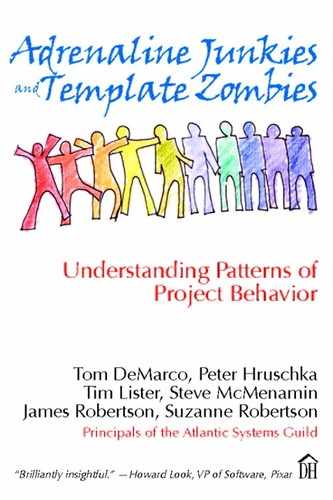74. Surprise!
,The manager offering rewards and incentives gets responses in addition to those he planned.
After six weeks of six- and seven-day workweeks, the release finally went in. The team was burned-out, but everyone on it was elated that the job was done and the system was on the air. After a brief hibernation from exhaustion, the team was back in the office, gathered around the project manager, who proclaimed victory and offered heartfelt thanks on behalf of the company. To show its appreciation, the company gave each member of the team a voucher for dinner for two at one of the best restaurants in town. As the vouchers in envelopes were passed around, jokes about ordering jeroboams of Veuve Clicquot champagne, chateaubriand, and the entire dessert tray filled the conversation. Once the team broke up and most people had headed back to work, one team member approached the PM and said, “Have this voucher back. If my wife ever thought that I worked the last month-and-a-half, leaving her alone with our two kids, for one measly dinner out, she’d shoot me.” The PM didn’t know how to respond.

The voucher was not a bad idea. For all but one member of the team, it was seen as just a token. It said, “Go relax and splurge a bit on us.” But one team member could not accept it as that. It would only look to his spouse as a cheap attempt at a buyout—no compensation for a huge amount of work that impinged on precious family time.
Rewards given from the organization to a team or to individuals are almost impossible to pull off perfectly, even when they are truly tokens, just thank-you gifts.
When organizations get in the habit of using prizes and rewards to entice a change in behavior or to sustain an unsustainable behavior, such as working six-day workweeks, they only succeed in antagonizing and demoralizing most recipients. Reward-giving organizations believe that they are positively reinforcing and recognizing outstanding performance, but they get caught up in a dysfunctional reward pattern in two ways: First, they give out rewards to the few, immediately spurring an unspoken emotional reaction of estrangement and inequity in all of the non-recipients: “How about me? I’ve been working my heart out over here. Where’s my prize?”
Second, the prize, something that is supposed to be a pleasant surprise, turns into an entitlement. Past recipients develop expectations, wondering, “What do you think we’ll get for finishing our project?” The prize has no positive effect at all.
Organizations that are locked into a pattern of rewards and prizes are never rewarded.
